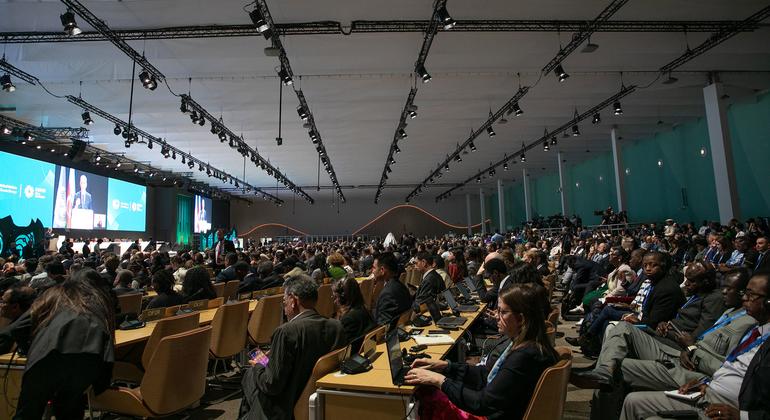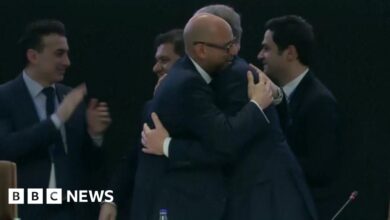COP29 climate talks end with $300 billion annual pledge, but developing nations call deal ‘an insult’

After two weeks of intense negotiations, delegates at COP29Officially the 29thth Conference of the Parties to the United Nations Framework Convention on Climate Change (UNFCCC), has agreed to provide this funding annually, with an overall climate funding target of “at least $1.3 trillion by 2035.”
The countries also agreed on rules for a U.N.-backed global carbon market. This market will facilitate the trading of carbon credits, encouraging countries to reduce emissions and invest in climate-friendly projects.
This was one of the key issues decided as the summit, taking place since November 12, at the giant Baku Stadium in the Azerbaijani capital, ran into double overtime. Another way is to expand a program that focuses on gender and climate change.
This summit is dubbed the ‘Climate Finance COP’ and representatives from all countries are looking to set a new, higher climate finance target.
Target or new common quantitative goals (NCQG), which will replace the current $100 billion target that is set to expire in 2025.
In the closing days at COP29, negotiating teams from developed and developing countries deadlocked over the final agreement, with reports saying that representatives of the least developed countries and the Union of Island States (AOIS) has left the negotiations.
‘A more ambitious outcome’
Reacting to the results, UN Secretary General António Guterres said that although the agreement at COP29 is absolutely necessary to maintain the 1.5 degree limit, “I was hoping for a more ambitious result – both financially and in mitigation – to meet the huge challenge we face.”
But the agreement is the basis on which to build, he continued, adding: It must be respected fully and on time. Commitments must quickly become cash. All countries must work together to ensure this new goal is achieved at its highest level.”
For many vulnerable countries, it represents a glimmer of hope – but only if commitments translate into quick action. The Secretary General emphasized: “Commitments must quickly become cash”, and called on all countries to cooperate to achieve the higher goal of the new financial target.
Beyond finance, COP29 builds on previous achievements on emissions reduction targets, accelerating the energy transition and the long-sought agreement on carbon markets. These achievements were achieved despite an “uncertain and divisive geopolitical context” that threatened to derail the negotiations.
The UN chief praised the negotiators for finding common ground, noting: “You have demonstrated that multilateralism – focusing on Paris Agreement – can find a way through the most difficult problems.”
‘An insurance policy for humanity’
UN climate change executive secretary Simon Stiell described the new financing target agreed at COP29 as “an insurance policy for humanity.”
“This agreement will continue to fuel the clean energy boom and protect billions of lives. It will help all countries share in the huge benefits of bold climate action: more jobs, stronger growth, cheaper and cleaner energy for all. But like any insurance policy – it only works – if the premium is paid in full and on time.”
He admitted that no country gets everything it wants and that the world leaves Baku with a mountain of work to do. “So this is not the time to win. We need to set our sights and redouble our efforts on the road to Belém,” in Brazil’s eastern Amazon region, which is scheduled to host COP30 next year.
‘Weak, insulting deal’
While some delegations welcomed the agreement, others, especially from developing countries, expressed deep disappointment at what they considered “insulting” and “insulting” financial targets. In fact, the agreed text failed to build on an agreement adopted last year calling on countries to make a “transition away from fossil fuels.”
The Indian representative strongly opposed the new target, calling it a “small amount of money” and emphasizing, “We seek much higher ambitions from developed countries.” [and the amount agreed] does not inspire confidence that we will escape the serious problem of climate change.”
A representative from a group of small island states said: “After this COP29 ends, we cannot just sail into the sunset. We are literally sinking,” and the conference outcome highlighted “our vulnerable countries are in a very different boat than developed countries.”

Civil society members at COP29 in Baku, Azerbaijan, support climate finance initiatives.
The representative of Sierra Leone said African countries were disappointed by the outcome, which “signals a lack of goodwill on the part of developed countries”. Indeed, the $300 billion deal “is less than a quarter of what science shows is needed and is hardly enough to avert climate catastrophe.”
Striking a different tone, a representative from the European Union delegation said the new climate finance target would “simply bring more private money to the table and that is what we need. And with this amount of money, we are confident that we will achieve the target of 1.3 trillion.”
Want to know more? Check out ours special events pagewhere you can find all our coverage of COP29, including stories and videos, our explainers and newsletters.




